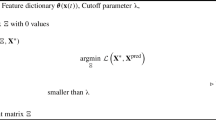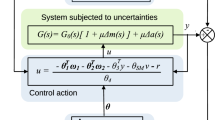Abstract
In this paper, we investigate the synthesis of minimum functional state observer for unperturbed and perturbed linear time invariant systems. The principal contribution is the design of a minimum functional state observer, which can estimate directly the state feedback control law. Hence, for the linear time invariant systems, the existence conditions of a minimum functional state observer are obtained by verification of a special dimension condition on system matrices. As a matter of fact, the exact solution of the proposed approach is determined, and the minimum functional state observer that has the same dimension as the control vector is derived by solving a set of linear matrix inequality (LMI) constraints. Whereas, for perturbed linear systems, the proposed minimum functional state observer scheme is developed to ensure the robust quadratic stability of the augmented system. The robustness issue is given via the reconstructed control law designed using an LMI based H∞ method; so that the desired design matrices are derived through the resolution of an optimum LMI system. The effectiveness and usefulness of the proposed approach are validated through a flexible link robot example.
Similar content being viewed by others
References
D.G. Luenberger, “Observers for multivariable systems,” IEEE. Trans. Automat. Contr., vol. 11, pp. 190–197, 1966.
Y. Xu, R. Lu, P. Shi, J. Tao, and S. Xie, “Robust estimation for neural networks with randomly occurring distributed delays and Markovian jump coupling,” IEEE Transactions on Neural Networks and Learning Systems, vol. 29, no. 4, pp. 845–855, 2018.
Y. Xu, R. Lu, P. Shi, H. Li, and S. Xie, “Finite-time distributed state estimation over sensor networks with round-robin protocol and fading channels,” IEEE Transactions on Cybernetics, vol. 48, no. 1, pp. 336–345, 2018.
Y. Wu, X. Meng, L. Xie, R. Lu, H. Su, and Z. Wu, “An input-based triggering approach to leaderfollowing problems,” Automatica, vol. 75, pp. 221–228, 2017.
Y. Wu, R. Lu, P. Shi, H. Su, and Z. Wu, “Adaptive output synchronization of heterogeneous network with an uncertain leader,” Automatica, vol. 76, pp. 183–192, 2017.
N. Benhadj Braiek and F. Rotella, “State observer design for a class of nonlinear system,” J. Syst. Analysis, Modelling and Simulation, vol. 17, pp. 211–227, 1995.
R. Aloui and N. Benhadj Braiek, “On the determination of an optimal state observer gain for multivariable systems: Application to induction motors,” J. of Automation and Systems Engineering, vol. 2, pp. 206–218, 2008.
W. Y. Leong, H. Trinh, and T. Fernando, “A practical functional observer scheme for interconnected time-delay systems,” Int. J. of Control, vol. 88, pp. 1963–1973, 2015.
Y. Wu, H Su, P. Shi, Z. Shu, and Z. G. Wu, “Consensus of multiagent systems using aperiodic sampled-data control,” IEEE Transactions on Cybernetics, vol. 46, pp. 2132–2143, 2016.
J. Y. Ng, C. P. Tan, H. Trinh and K.Y. Ng, “A common functional observer scheme for three systems with unknown inputs,” J. of the Franklin Institute, vol. 353, no. 10, pp. 2237–2257, 2016.
H. Hassani, J. Zarei, M. Chadli, and J. Qiu, “Unknown input observer design for interval type-2 TS fuzzy systems with immeasurable premise variables,” IEEE Transactions on Cybernetics, vol. 47, no. 9, pp. 2639–2650, 2017.
Y. Xu, R. Lu, H. Peng, K. Xie, and A. Xue, “Asynchronous dissipative state estimation for stochastic complex networks with quantized jumping coupling and uncertain measurements,” IEEE Transactions on Neural Networks and Learning Systems, vol. 28, pp. 268–277, 2017.
Y. Wu, H. Su, P. Shi, R. Lu, and Z. Wu, “Output synchronization of nonidentical linear multiagent systems,” IEEE Transactions on Cybernetics, vol. 47, pp. 130–141, 2017.
C. Liu, H. Lam, T. Fernando, and H. H. Iu, “Design of fuzzy functional observer-controller via higher order derivatives of Lyapunov function for nonlinear systems,” IEEE Transactions on Cybernetics, vol. 47, pp. 1630–1640, 2017.
L. Li, M. Chadli, S. X. Ding, J. Qiu, and Y. Yang, “Diagnostic observer design for TS fuzzy systems: application to realTime weighted fault detection approach,” IEEE Transactions on Fuzzy Systems, vol. 26, no. 2, pp. 805–816, 2018.
A. S. Tlili, “Robustness design of a dynamic outputfeedback decentralized controller using H¥ synthesis and LMI paradigm,” International Journal of Control, Automation, and Systems, vol. 15, no. 4, pp. 1544–1552, 2017.
J. R. Roman and T. E. Bullock, “Design of minimal order stable observers for linear functions of the state via realization theory,” IEEE Transactions on Automatic Control, vol. 20, pp. 613–622, 1975.
M. Darouach, “Functional observers for linear descriptor systems,” Proc. of 17th Mediterranean Conference on Control and Automation, 2009.
H. Trinh and T. Fernando, Functional Observers for Dynamical Systems, Springer, 2012.
R. Aloui, R. Ouhibi, and N. Benhadj Braiek, “Minimal functional observer for linear time invariant systems,” Proc. of Int. Conf. on Control, Engineering and Information Technology (CEIT’13), vol. 4, pp. 165–168, 2013.
R. Mohajerpoor, H. Abdi, and S. Nahavandi, “Minimal unknown-input functional observers for multi-input multioutput LTI systems,” J. Process Control, vol. 35, pp. 143–153, 2015.
N. Eskandari, Z. J. Wang, and G. A. Dumont, “On the existence and design of functional observers for LTI systems, with application to user modeling,” Asian Journal of Control, vol. 18, no. 1, pp. 192–205, 2016.
F. Rotella and I. Zambettakis, “A direct design procedure for linear state functional observers,” Automatica, vol. 70, pp. 211–216, 2016.
M. Darouach, “Existence and design of functional observers for linear systems,” IEEE Transactions on Automatic Control, vol. 45, pp. 940–943, 2000.
T. E. Fortmann and D. Williamson, “Design of low-order observers for linear feedback control laws,” IEEE Transactions on Automatic Control, vol. 17, pp. 301–308, 1972.
M. Hou, A. C. Pugh, and P. C. Muller, “Disturbance decoupled functional observers,” IEEE Transactions on Automatic Control, vol. 44, pp. 382–386, 1992.
P. Murdoch, “Observer design for a linear functional of the state vector,” IEEE Transactions on Automatic Control, vol. 18, pp. 308–310, 1973.
D. W. Russell and T. E. Bullock, “A frequency domain approach to minimal-order observer design for several linear functions of the state,” IEEE Transactions on Automatic Control, vol. 22, pp. 600–604, 1977.
T. Fernando, K. Emami, S. Yu, H. H. Iu, and K. P. Wong, “A Novel quasi-decentralized functional observer approach to LFC of interconnected power systems,” Accepted by IEEE Transactions on Pouwer Systems, 2016.
C. C. Tsui, “What is the minimum function observer order,” Proc. 3rd Word Congress Intell. Control Autom., China, pp. 2811–2816, 2000.
T. L. Fernando, H. M. Trinh, and L. Jennings, “Functional observability and the design of minimum order linear functional observers,” IEEE Transactions on Automatic Control, vol. 55, no. 5, pp. 1268–1273, 2010.
C. Y. Kee, C. P. Tan, K. Y. Ng, and H. Trinh, “New results in robust functional state estimation using two sliding mode observers in cascade,” Int. J. Robust Nonlinear Control, vol. 24, pp. 2079–2097, 2014.
A. Z. Asanov and D. N. Demyanov, “Analytical synthesis of functional low-order observers,” Journal of Computer and Systems Sciences International, vol. 54, no. 4, pp. 505–513, 2015.
C. Tsui, “Observer design-a survey,” Int. J. Automation and Computing, vol. 12, no. 1, pp. 50–61, 2015.
R. Mohajerpoor, L. Shanmugam, H. Abdi, S. Nahavandi, and J. H. Park, “Delay-dependent functional observer design for linear systems with unknown timevarying state delays,” IEEE Transactions on Cybernetics, DOI:10.1109/TCYB.2017.2726106, 2017.
Y. Xiong and M. Saif, “Unknown dusturbance inputs estimation based on a state functional observer design,” Automatica, vol. 39, pp. 1389–1398, 2003.
H. Deng and H. X. Li, “Functional observers for linear systems with unknown inputs,” Asian Journal of Control, vol. 6, pp. 462–468, 2004.
T. Fernando and H. Trinh, “Design of redured-order state/unknown input observers based on a descriptor system approach,” Asian Journal of Control, vol. 9, pp. 458–465, 2007.
M. Darouach, “On the functional observersfor linear descriptor systems,” Systems & Control Letters, vol. 61, pp. 427–434, 2012.
A. Sassi, M. Zasadzinski, A. H. Souley, and K. Abderrahim, “A robust reduced order functional H¥ observer for time delay bilinear systems,” Proc. of 25th Mediterranean Conference on Control and Automation (MED), Malta, pp. 637–642, 2017.
Q. P. Ha, H. Trinh, H. T. Nguyen, and H. D. Tuan, “Dynamic output feedback sliding mode control using pole placement and linear functional observers,” IEEE Transactions on Industrial Electronics, vol. 50, pp. 1030–1037, 2003.
M. Ezzine, H. Souley Ali, M. Darouach, and H. Messaoud, “A controller design based on a functional H¥ filter for descriptor systems: the time and frequency domain cases,” Automatica, vol. 48, pp. 542–549, 2012.
J. Lan and R. J. Patton, “Robust fault-tolerant control based on a functional observer for linear descriptor systems,” IFAC-PapersOnLine, vol. 48, pp. 138–143, 2015.
C. C. Tsui, “An overview of the applications and solution of a fundamental matrix equation pair,” J. of Franklin Institute, vol. 341, pp. 465–75, 2004.
H. Trinh, S. Nahavandi, and T. D. Tran, “Algorithms for designing reduced-order functional observers of linear systems,” Int. J. Innovative Computing, Information and Control, vol. 4, pp. 321–333, 2008.
F. Rotella and I. Zambettakis, “Minimal single linear functional observers for linear systems,” Automatica, vol. 47, pp. 164–169, 2011.
F. Rotella and I. Zambettakis, “On minimum functional observers for linear time-varying systems,” IEEE Transactions on Automatic Control, 2011.
H. M. Tran and H. Trinh, “Minimal-order functional observer-based residual generators for fault detection and isolation of dynamical systems,” Mathematical Problems in Engineering, vol. 2016, Article ID 2740645,17 pages, 2016.
R. Mohajerpoor, L. Shanmugama, H. Abdia, S. Nahavandia, and M. Saif, “Functional observer design for retarded system with interval time-varying delays,” Int. J. of Systems Science, vol. 48, pp. 1060–1070, 2017.
P. Borne, G. Dauphin-Tanguy, J. P. Richard, F. Rotella, and I. Zambettakis, Commande et Optimisation des Processus, vol. 1, Technip, 1990.
S. D. G. Cumming, “Design of observers of reduced dynamics,” Electron. Lett., vol. 5, pp. 213–214, 1969.
H. R. Sirisena, “Minimal order observers for linear functions of a state vector,” Int. J. Control, vol. 29, pp. 235–54, 1979.
M. Darouach, “Linear functional observers for systems with delays in state variables,” IEEE Transactions on Automatic Control, vol. 46, no. 3, pp. 491–496, 2001.
P. C. Muller and M. Hou, “On the observer design for descriptor systems,” IEEE Transactions on Automatic Control, vol. 38, pp. 1666–1671, 1993.
R. Engel and G. Kreisselmeier, “A continuous-time observer which converges in finite time,” IEEE Transactions on Automatic Control, vol. 47, pp. 1202–1204, 2002.
A. J. Koshkouei and A. S. I. Zinober, “Sliding mode state observation for non-linear systems,” Int. J. Control, vol. 77, pp. 118–127, 2004.
R. Aloui and N. Benhadj Braiek, “Optimal state observer design for nonlinear dynamical systems,” Nonlinear Dynamics and Systems Theory, vol. 12, pp. 37–48, 2012.
Author information
Authors and Affiliations
Corresponding author
Additional information
Recommended by Associate Editor M. Chadli under the direction of Editor Duk-Sun Shim.
Ridha Aloui received his Master of Automatic and Numerical Treatment and his Ph.D. Thesis in Electrical Engineering both from Ecole Supérieure des Sciences Techniques de Tunis, in 2004 and 2010 respectively. He is currently an Assistant Professor in Institut National des Sciences Appliquées et de la Technologie de Tunis and a member of Laboratory of Advanced Systems (LSA) in the Ecole Polytechnique de Tunisie. His current research interests include observation and control design methods for nonlinear complex systems with application on electromechanical processes.
Naceur Benhadj Braiek received his Master of Electrical Engineering and the Master of Systems Analysis and Numerical Treatment, both from Ecole Nationale d’Ingénieurs de Tunis in 1987, the Master of Automatic Control from Institut Industriel du Nord (Ecole Centrale de Lille) in 1988, the Ph.D. degree in Automatic control from Université des Sciences et Techniques de Lille, France, in 1990, and the Doctorat d’Etat in Electrical Engineering from Ecole Nationale d’Ingénieurs de Tunis in 1995. Now, he is a Professor of Electrical Engineering at the University of Tunisia. He is the Director of the Laboratory of Advanced Systems (LSA) at the Ecole Polytechnique de Tunisie. His domain of interests is related to the modelling, analysis and control of nonlinear systems with applications on electrical processes.
Rights and permissions
About this article
Cite this article
Aloui, R., Braiek, N.B. Synthesis of a Minimum Functional State Observer Approach for Unperturbed/Perturbed Dynamical Systems. Int. J. Control Autom. Syst. 16, 1736–1745 (2018). https://doi.org/10.1007/s12555-017-0144-9
Received:
Revised:
Accepted:
Published:
Issue Date:
DOI: https://doi.org/10.1007/s12555-017-0144-9




